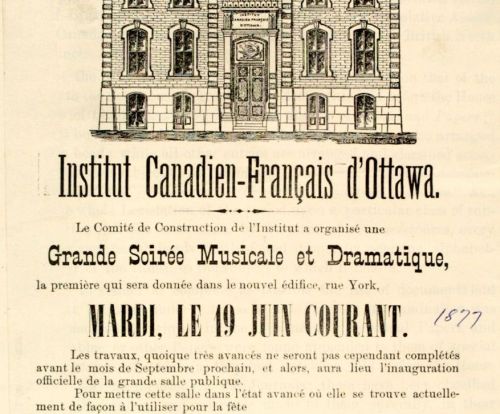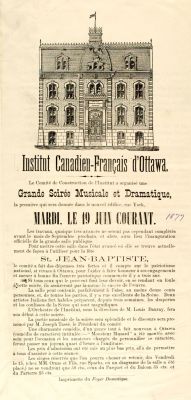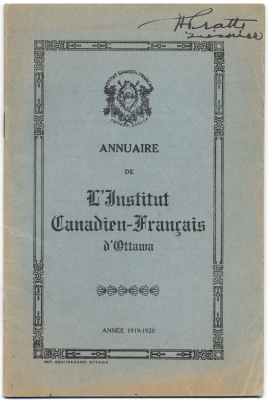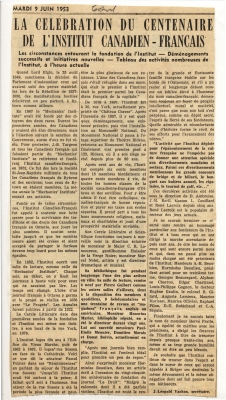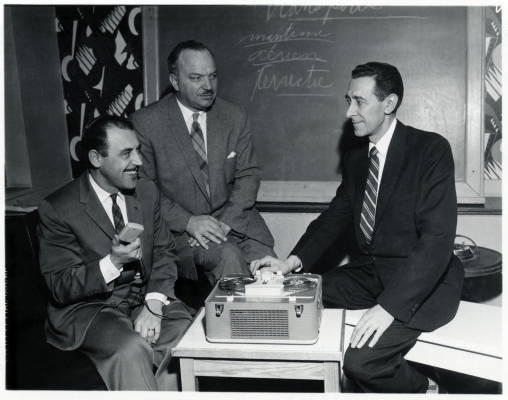Ottawa is designated as the capital of Canada in 1857. Civil servants and parliamentarians converge on the new seat of government. Journalists and members of the liberal professions join them, evolving along with the growing city. They come from Québec and Montréal, two cities that already have an Institut canadien, or from other places in Quebec that have reading rooms or literary societies. In Ottawa, these Francophones seek to recreate the dynamic cultural life to which they are accustomed. Educated, or at least highly knowledgeable, they form a community large enough to support numerous cultural institutions in the region. Not to mention the presence, among them, of writers such as Antoine Gérin-Lajoie, who has already published his novel Jean Rivard when he settles in Ottawa with his family in 1865. This nascent intellectual elite helps Ottawa establish itself within the cultural space of French Canada.
Many of these members join the Institut canadien-français d’Ottawa. Since its foundation in 1852, it offers a reading room, a library and a drama circle, which is recognized as a pioneer of French theatre in the region. The Cercle littéraire de la jeunesse catholique d’Ottawa is added in 1862, followed in 1870 by the Cercle des familles, founded by Stanislas Drapeau. Its events, “embellished with music, singing and sometimes one-act comedies,” attract, according to historian Jean-Yves Pelletier, “large crowds.”1 The institute establishes the first literary and scientific circle in 1894, and sets up a literary committee in 1905. A third literary circle is founded in 1920, renamed the “Cercle littéraire Benjamin-Sulte” in 1961, in tribute to one of the pillars of the Institute in the 19th century.
The Institut canadien-français d’Ottawa is credited with organizing the first major literary conference in the country. In 1877, on the occasion of Ottawa’s 25th anniversary, the institute invites a host of literary figures, historians and other French-Canadian “scholars.” “Almost all the outstanding figures of our little literary Pantheon were gathered together,”2 recalls Séraphin Marion in a report on the origins of the Institut. The goal is to set up a Société littéraire du Canada, which would bring together the country’s most famous writers every year.
The Institut canadien-français d’Ottawa creates an orchestra in 1878, conducted by Louis D’Auray. Renowned Ottawa musicians as well as many artists of international repute perform with the orchestra. In 1881, the Institut’s Société des beaux-arts is established, endowed with a technical library and a museum.
The Progrès d’Ottawa, Ontario’s first French-language weekly, comes into being in 1858 with support from the Institut canadien-français. But its life is short. Three years later, the Institut establishes Le Courrier d’Ottawa (Courrier d’Outaouais), which is published for more than fifteen years. The institute’s courses and public lectures offer a forum for well-known French-speaking politicians and writers from across the country – Arthur Buis, Louis Fréchette, Henri-Raymond Casgrain, Thomas Chapais, Father Lionel Groulx and Olivar Asselin – which add to its renown.
Today, the Institut canadien-français d’Ottawa is still located in the ByWard Market, its membership restricted to men.
1 Jean-Yves Pelletier, « L’Institut canadien-français d’Ottawa (fondé en 1852) : la doyenne des sociétés françaises de l’Ontario », dans Jeff Keshen et Nicole St-Onge (dir.), Construire une capitale : Ottawa, Making a Capital, University of Ottawa Press/Les Presses de l’Université d’Ottawa, 2001, p. 134 (translated from the original).
2 Séraphin Marion, « Origines de l’Institut canadien-français d’Ottawa et de la Société royale du Canada », Les Cahiers des Dix, no 39, 1974, p. 81 (translated from the original).
Poster announcing a grand music and drama evening, organized by the Comité de Construction of the Institut canadien-français d'Ottawa building project, Ottawa, June 19, 1877, p. 1-2. The establishment of Parliament in Ottawa stimulates cultural life in the capital, demonstrated by the richness of the event program, with participation by the Institut’s symphony orchestra and drama circle.
University of Ottawa, CRCCF, Fonds Institut canadien-français d’Ottawa (C36), C36V18.
